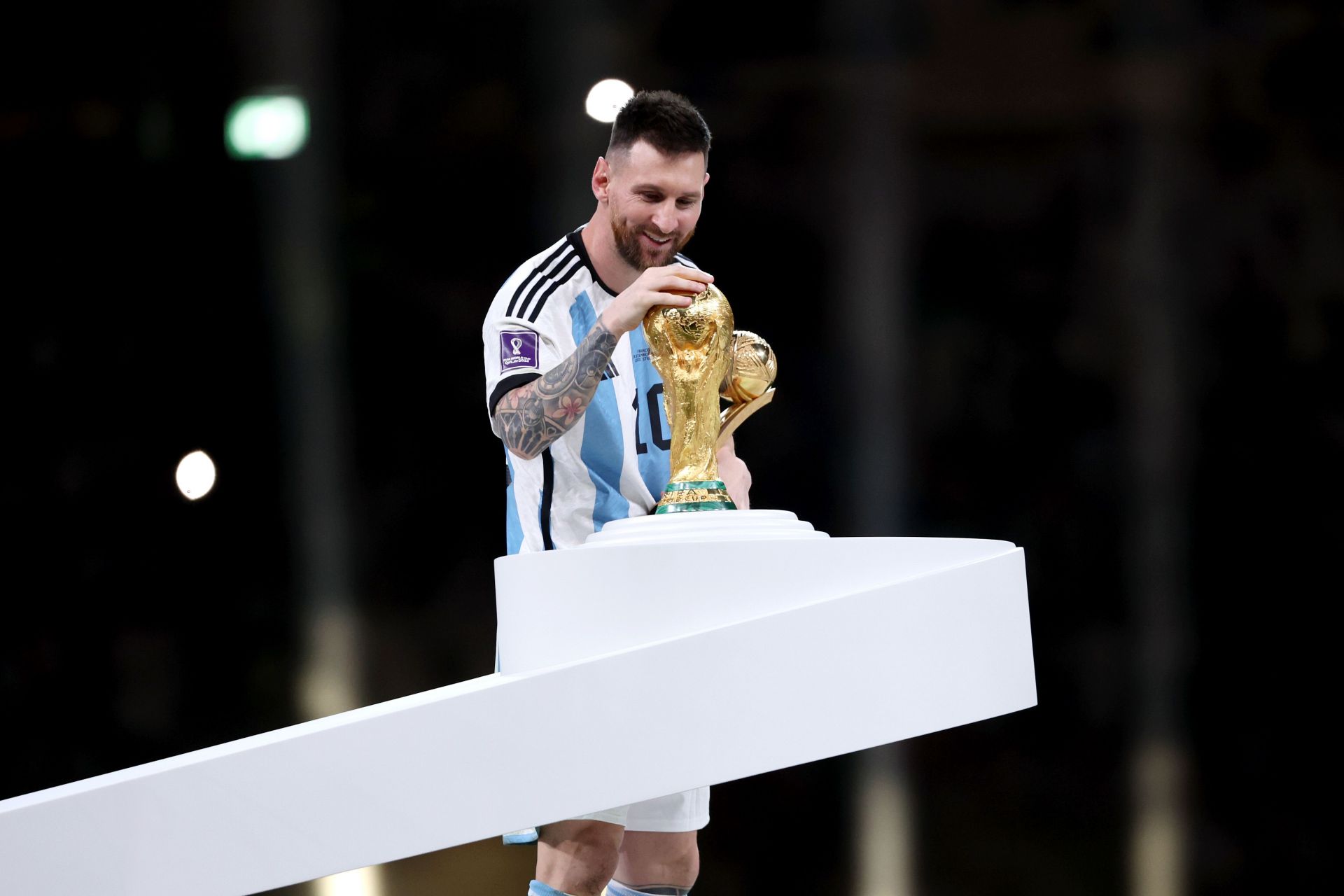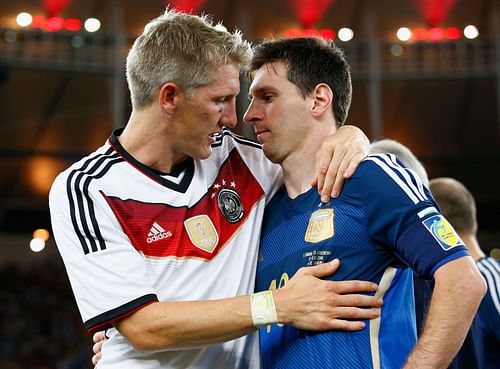
Why Lionel Messi and his World Cup win mean so much even to those who don't follow football
Anyone who knows me probably also knows of my tendency to shut down in the midst of a match where I am deeply invested in the result. A sporting contest involving your favorite athlete or team can get really stressful, and my way of dealing with it is to switch off the TV, go off social media, and check the result only after the match is done.
That need to 'switch off' is usually restricted to tennis for me (and before the 2010s, to tennis and cricket). But on Sunday, right from the moment Lionel Messi's Argentina took the field against France for the World Cup final, the paralyzing fear kept threatening to raise its ugly head.
Around the 75-minute mark, with La Albiceleste just 15 short minutes away from nirvana, the tension finally got too high. If Messi lost from there, surely there would be no way to recover. So I took refuge in Netflix, and waited for the clock to wind down.
If only it were that simple though. In almost no time, the shouts of my neighborhood fans (many of whom were supporting France) at Kylian Mbappe's goals got me out of my self-imposed stupor. I quickly realized it was going to be impossible to disconnect from this one, so I made myself sit through every last minute of torture as Argentina kept trying to make a mess of things.
The penalty shootout was a spectacularly nerve-racking affair, and it took me every last ounce of courage to keep looking at the TV screen.
When Gonzalo Montiel fired in the winning shot, it almost felt too good to be true. It was only after I saw Messi collapsing to the ground and being jumped on by the rest of the team, did it sink in: he had finally done it.
The funny thing, of course, is that none of this should have even mattered to me. Football has never been my sport; I don't even understand some of its finer technicalities. And yet when I saw Messi curled up like a baby with the most precious smile on his face, I almost teared up.
24 hours later, it is clear that I was far from being the only non-football fan overcome with emotion at Messi's (and Argentina's) historic win. In fact, I have never before seen so many people united in joy at a single sporting result. It feels like the entire world has come together to revel in this moment, to coronate the King.
Why does Messi matter so much? To begin with, there is the obvious: his visual appeal. Even if you are someone who doesn't watch much football, just one glance at Messi doing his thing on the field is enough to convince you he's no ordinary player. The effortlessness of his dribbling, the hypnotic way he weaves through defenders, the casual touches of genius that make it seem like the ball is an extension of his feet - it's all a little too mesmerizing to ignore.
The fact that Messi is usually dwarfed by the physically imposing opponents he faces only adds to the mystique. He is a maestro who still somehow looks like that little kid from Rosario, and who regularly stares down - and defeats - the giants of the footballing world. You can't help but get drawn in.
There's also the suddenness of his maze-runner moves that makes for thoroughly compelling viewing.
For large stretches of his matches, Messi seems invisible. You search for him amid the crowd of players on the pitch, hoping to be amazed by his wizardry, but you keep drawing a blank. Now experts will tell you that that is part of his genius; that his ability to bide his time, visualize the space around him, and wait for the right moment to establish his positional advantage is what makes him so special. But to casual viewers like me, his sudden appearance in the thick of the action, conjuring a goal threat out of nowhere, looks positively like a magic trick.
Messi's off-field personality has contributed to his legend too. He is diminutive not only in stature, but also seemingly in demeanor. You almost never hear him make outrageous comments to the press, or really, display any kind of bad behavior in public.
Sure, Messi is not Mr. Nice Guy to a fault, like say a Rahul Dravid or a Dominic Thiem. And his tax evasion controversy is not quite in the rearview mirror yet. But instances of his alleged rudeness have been few and far between, and tax evasion is perhaps the most easily forgivable of crimes to get embroiled in.
Messi is, today, widely regarded as the personification of sportsmanship and humility. When you are that successful at your job and that aesthetic with your work, merely not doing anything horrible is enough for you to be put on a pedestal.
This is where the oft-repeated parallels with a genius from another sport start to become sharper. Just like Lionel Messi, Roger Federer has spent the better part of the last two decades making everyone believe in divinity. And just like Messi, the Swiss is also considered a paragon of niceness, despite having thrown around more than a few arrogant comments in his day.
It's no coincidence that both Messi and Federer have hordes of fans all across the globe. They have transcended their sport by combining artistry with success in a way that few others in any field ever have. They are the darlings of the media for a reason, and their victories never fail to inspire a string of poetic eulogies.
Messi's fans far outnumber those of Federer though, partly because football is wildly more popular than tennis can ever hope to be. But there's another factor at play too: Messi's relatability.
Federer, with his fashionable persona and sophisticated eloquence, evokes as much awe as he does love. The Swiss is often considered to be an ethereal entity, a being that can never be touched or even reached. But Messi? Messi is one of our own.
I have, in the past, talked about how fans tend to look at their favorite sports stars the way parents look at their children. That is perhaps truer in Messi's case than any other.
He's the kid with that impish smile, he's the kid who battled a growth disorder in his early days, he's the kid who always stays away from the spotlight, he's the kid who just wants to play football. Almost everything about Messi makes you want to protect him and to fight for him, no matter how old or accomplished he may get.
When that 2014 World Cup final debacle occurred, I felt like punching every troll that criticized him. And the 2016 Copa America penalty miss (and subsequent retirement flip-flop) made me want to ask every meme-maker what they had ever done in their lives to think they had a right to make fun of him.

My outrage wasn't directed at just the haters and trolls. When Gonzalo Higuain and Lautaro Martinez missed their chances, I cursed them more than I have ever cursed any athlete (well, except maybe a certain rape-accused player).
Messi didn't need all of my silent seething of course; he was - and is - doing just fine without any of it. But the beauty of sport is that it is not about just the players on the field. It is also about what those players make the fans feel, and how those players create legacies that go far beyond mere statistics and records.
That Messi has the statistics and records is without argument. He has racked up nearly a dozen domestic leagues, four European Championships, seven Ballon d'Or awards, a Copa America, and now the last missing piece - the World Cup. And admittedly, all those laurels make it easy to root for Messi; why wouldn't you hunt for glory from a player who already has so much of it?
What was never easy, however, was rooting for him when he attempted to win something of note with his nation. For all of Messi's seemingly effortless success with Barcelona, his campaigns with the Argentina team were nothing short of torturous.
When Mbappe equalized with that last-gasp goal, and Randal Kolo Muani nearly put France through before a desperate Emiliano Martinez save kept Argentina in it, I started to think Messi was just not destined for World Cup glory. And this time, his failure seemed likely to hurt a million times more.
Messi had tried his best to get past eight years of misery, putting in one terrific performance after another, and yet it wasn't going to be enough. He had been superhuman through seven matches in Qatar, only to be reminded of his humanity at the very last minute. Losing from 2-0 and 3-2 up was bound to open up an entirely new - and more painful - set of wounds; it was bound to break even the strongest of us.
But destiny had other ideas. Messi's teammates rose to the occasion in the penalty shootout, just like they had for most of this tournament, and catharsis was achieved. The next few moments seemed to go by in a blur at the time, but they will undoubtedly become indelible in the years to come, played on repeat countless times.
The picture of Messi kissing the World Cup trophy while cradling his Golden Ball award was one for the ages, as was the clip of him being hoisted in the air and carted around the ground in a rip-roaring victory lap. They were images that resonated with everyone, given all that had come before. For that one brief moment in history, the entire world was a Messi fan.
Could a fairytale get any more fairytale-like?
"Messi on a million backs, Messi for a million flashbulbs," rang Peter Drury's voice in the quickly packaged tribute video by FIFA. The fact that those 'millions' could be made up entirely of non-football fans makes Messi's legacy truly unmatched - even to the point of making the GOAT debate irrelevant.
Messi and his team have just given us a million more reasons to root for him, like there weren't enough reasons already. Why does the man mean so much? The answer is simple, really: he is one of us, and yet he is also one of the immortals.